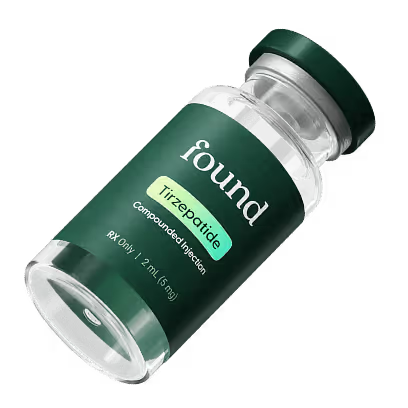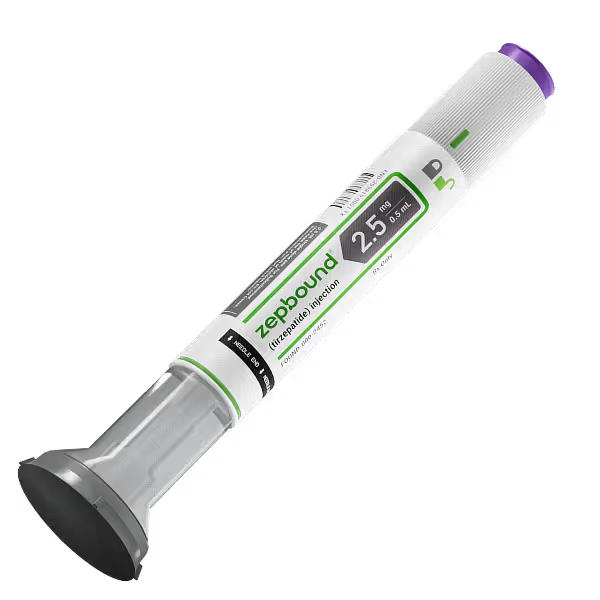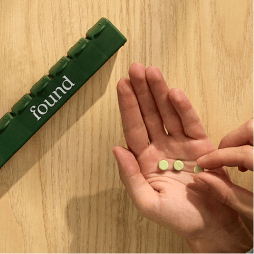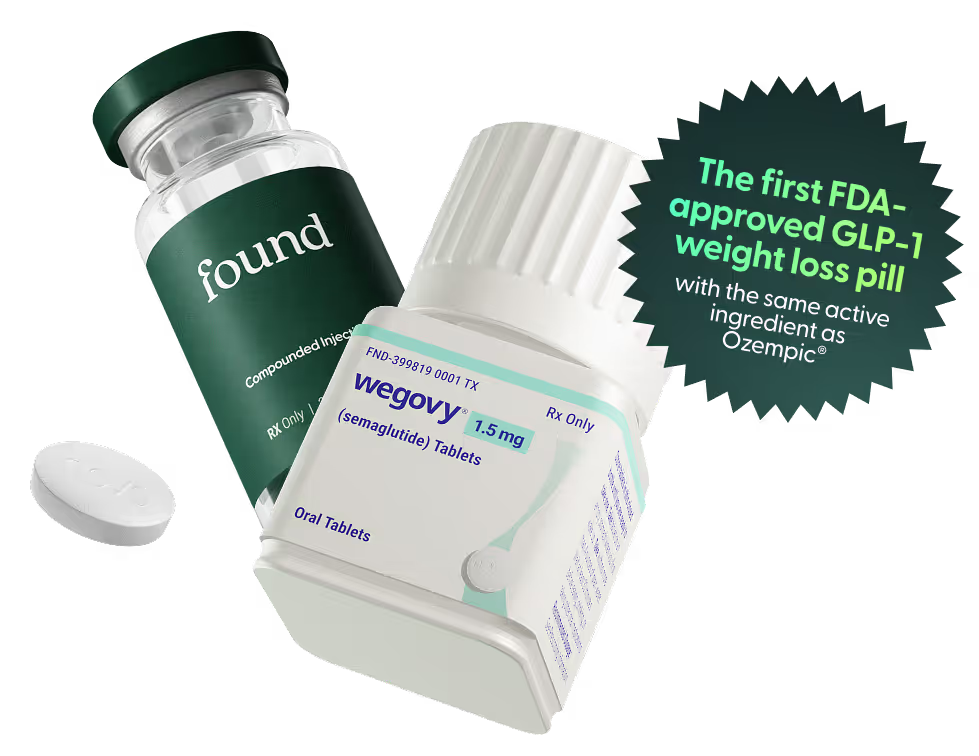NEW
$100 off on your first month of select medications
Weight loss is now more affordable
Now offering the WegovyⓇ Pill
10+ weight loss medication options
Select insurance now accepted






.avif)
Wegovy® Pill
Semaglutide Tablets

NEW

Tirzepatide
Compounded Injection


Zepbound®
Compounded


Ozempic®
Compounded

Let's find the right treatment for you
IMPORTANT | *Certain medications are FDA-approved for conditions other than weight. Found is not affiliated with or endorsed by Novo Nordisk A/S., the owner of the registered trademark Ozempic® and Eli Lilly & Co., the owner of the registered trademarks Zepbound®. Insurance coverage, pricing & terms vary. Compounded GLP-1s are not FDA- approved or evaluated for safety or efficacy, and not available in all states. Rx is subject to provider review and clinical eligibility. Advertised pricing for branded GLP-1s via insurance w/ 12 month commitment. Advertised pricing for non-GLP-1s w/ 12 month commitment. Copays, coinsurance & deductibles may apply. Imagery for illustrative purposes only. See risk info here and offer terms here.
How does it work?
Found makes it easier than ever to help you get access to affordable weight loss Rx 100% online.

Get qualified
Determine your eligibility for the Found program

Meet your provider
Your Found clinician will personalize a prescription for you based on your needs

Tailor your care
Your care provider adjusts your care to help you succeed

Start your program
Begin seeing and feeling results as soon as month 1
How Found Helps You Save
Found is the only telehealth provider that allows you to use your insurance benefits to save on compound-ed GLP-1s,
with insurance accepted for ⅓ Americans. Plus, we give you the same price for every dose — whether you're paying with insurance or not.
Insurance plans accepted in
Alabama
Arizona
California
Colorado
Connecticut
Florida
Georgia
Hawaii
Idaho
Illinois
Indiana
Iowa
Kansas
Kentucky
Maine
Maryland
Massachusetts
Michigan
Minnesota
Missouri
Montana
Nebraska
Nevada
New Hampshire
New Jersey
New York
North Carolina
North Dakota
Ohio
Oklahoma
Oregon
Pennsylvania
South Carolina
South Dakota
Tennessee
Texas
Utah
Virginia
Washington
Wisconsin
Wyoming
Thank you! Your submission has been received!
Oops! Something went wrong while submitting the form.
Available plans




Wisconsin
Available plans




Wyoming
Available plans




Washington
Available plans




Virginia
Available plans




Texas
Available plans




Utah
Available plans




Ohio
Available plans




Tennessee
Available plans




South Dakota
Available plans




South Carolina
Available plans




Oklahoma
Available plans




Pennsylvania
Available plans




Oregon
Available plans




North Dakota
Available plans




North Carolina
Available plans




New York
Available plans




New Mexico
Available plans




New Jersey
Available plans




New Hampshire
Available plans




Nevada
Available plans




Nebraska
Available plans




Montana
Available plans




Missouri
Available plans




Minnesota
Available plans




Arizona
Available plans




Michigan
Available plans




Massachusetts
Available plans




Maryland
Available plans




Maine
Available plans




Kentucky
Available plans




Kansas
Available plans




Iowa
Available plans




Indiana
Available plans




Illinois
Available plans




Idaho
Available plans




Georgia
Available plans




Hawaii
Available plans




Florida
Available plans




Alabama
Available plans




Connecticut
Available plans




Colorado
Available plans




California
No plans available for this state
See how much we can save
How our members found themselves
Real members. Real stories. Real results.
Before

After

Colleen
lost
280 lbs

I found I'm getting my life back. I am now the best version of myself that I have been in over 20 years.
Colleen

Back
lost
280 lbs

120 pounds down through Found and I no longer have sleep apnea, which is such a relief and I'm sleeping so much better.
Jessica
lost
120 lbs
Before

After

Christie
lost
49 lbs

I’m happy to say consistency is key.
Christie

Back
lost
49 lbs

I'm living a more productive, happy, and full life.
Nicole
lost
80 lbs
Before

After

Lupe
lost
43 lbs

Found has made a huge difference in my life.
Lupe

Back
lost
43 lbs

Found helped me find the missing link in my life.
Mima
lost
35 lbs
*Real member(s), paid for appearance. individual results may vary. In 1 year, Found users lost an avg. of 12% body weight. Results based on data from 1,773 users who reported their weight at least 1 time/week on avg. for 1 year. RX are up to a medical provider’s discretion. See below for risk info here.
Our medical expert

As Found's Senior Medical Advisor, I help design the clinical protocols that guide the medical care Found's members receive— care that is guided by the latest advancements in obesity medicine.
Introducing
MetabolicPrint™
Explore your personalized profile that uncovers the root causes of your weight challenges, based on your biology and habits.


